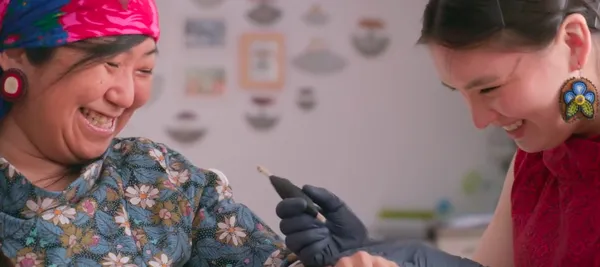 |
| Tautuktavuk |
Tautuktavuk, aka What We See, is one of the most deeply personal films at this year’s Toronto International Film Festival. Directed by Lucy Tulugarjuk and Carol Kunnuk, it draws on their own life experiences and those of people close to them, to tell the story of two Inuit sisters who are dealing with the legacy of child abuse and with present day domestic abuse, in the context of emotions being intensified by Covid lockdowns. Lucy and I met up during the festival to discuss the film, some of the stories behind it, and the issues which the Inuit community has had to deal with in the past and the present day. Readers should be aware that this conversation touches on some upsetting topics.
“I was trying to bring in the truth of what's happened in our community of people, and to a lot of people in Inuit communities,” Lucy explains.
Was using fiction to tell real stories a way of getting at subjects which would be too difficult to discuss otherwise?
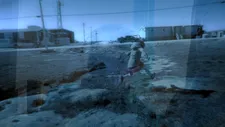 |
| Tautuktavuk |
“Yeah,” she says. “I was talking to my cousin Carol Kunnuk about this, how to bring a woman's point of view, a message that is important to the audience. We talked about it maybe three years ago, and we got permission to use part of the story and combine it amongst the three of us ladies, to bring it up front. Hopefully, for more people to understand why we are often put into a stereotype as the Inuit, living in the north or in the south. Often there's just judgement before any time to be given space to explain. I think it was a way for me to see that. Our hurt may be present, but it may be from the past that we need to recover from. So that little girl running is my symbol of ‘this is what happened to me, this is why I was hurt and this is why I was hurting other people.’ But there are steps to to recover.”
The stories within the film seem very, very conscious of that need to recover and that there is a way to do it - and that it's important to think about how you're treating other people and not wanting to pass on the hurt. That's something which doesn't get talked about a lot in film. There’s usually a lot more focus on people being hurt rather than on ways to get beyond that. Is that an important aspect of it for her?
“Yes, it is. Because I think that so, many things happen within a short period of time to Inuit, First Nations and Métis from dependency on government to reclamation of being independent again and not feeling shame to be who we are. Traditionally the elders would gather with the person or people that are having conflict and deal with the subject matter face to face, versus switching to a justice system that does not work for us. There's that gap in between the two worlds that I'm hoping to make both peoples understand, the Inuit and non-Inuit. This is what we went through from our own perspective, our own storytelling,”
We talk about the impact of Covid on Inuit people’s lives.
“One of my children was at the International School in Montreal, so there was a time where I was very nervous about being isolated and feeling did I pass it to my colleagues? My cousin Carol was not being able to go to a store, there were restrictions, and I couldn't travel up north. So some scenes we would have done person to person, we had to adjust to zoom calls, because I couldn't travel north because of restrictions due to people not being able to enter Nunavut, because for a very long time Nunavut had zero Covid, thanks to Dr. Patterson. He did such a great job that it was the longest in Canada not to have Covid.
“It was scary to think maybe I might bring it, because Montreal was one of the red alerts. So we had to isolate for 14 days. And then because I got a cold, the day before we left to Nunavut, I was given five more extended days, which also meant less time for me to shoot and finish the project. I couldn't bring my original crew that I hoped to bring in. I had a much smaller group of crew from home. Originally, we had a crew from home and also a southern team come to help us make the film, but this time only Nunavut beneficiaries were able to enter. Therefore, my daughter and I were able to enter but my crew couldn't. So it was complicated, but we found a way to make it work, thank goodness.”
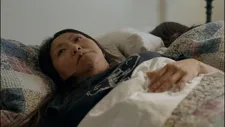 |
| Tautuktavuk |
The film draws in part on her own experiences during lockdown. At first, she explains, it wasn’t so bad, but there was a down side to being under less work pressure than usual.
“I felt so free. I didn't need to go to work. I was working from home, my children were involved. Everything was locked up. So you think and you think and you think, and then memories come back. So it was so important to continue to have family connection over either phone calls or internet. Luckily, Carol and I were able to work from home so we were always active, but we know family members who lost their jobs and it was very hard on them.”
Part of the film addresses abuse which happened within the Church. Is that something which prompted some people to connect more with traditional religious practices, as a way of moving away from the Church?
“I’m not sure if it’s moving away or if it's reclaiming traditional knowledge,” she reflects. “But I guess my point of view of that is, once we were ashamed about traditional drum dancing, and traditional songs, and throat singing. My parents were very traditional, and also religious, so I saw both worlds of religion and spirituality, which was beautiful.
“I cannot speak for others, but once I became old enough I told my parents that I think I feel ready to not go to church, and not feel like I'm sinning just because I didn't go to church. Trying to step away from that controlled environment was a way for me to say to my birth mother ‘No, I'm not going to Hell just because I'm not going to church every Sunday.’
“Sometimes it's good to remember, we had our own spirituality, too. For millennia. From my experience, being forced into religion and then stepping away, I was learning to also still respect the religion. At first there was a period of time where I hated the Roman Catholic Church, but my sister opened my mind through our conversations. I may be angry at this person or that person, but it's not the whole religion that is the cause of it. It's the people that were involved in that religion.”
She had to go through a lot of counselling to get to the point where she could discuss this subject at all, she says.
“I was nervous to bring it up to my biological mother. She knows that I make films. She knows that I was making a film about violence, and feelings, but she doesn't know the depth of how much I shared that was supposed to be a secret. My hope is to have someone think that it's okay to talk about it. And it feels safe to say ‘I'm okay, even though this is what happened.’ Because I also see close family members who are still crying silently, and being influenced and numbing it, and ignoring the fact that that happened. And the longer we ignore the hurt, it stays longer. So I hope that this film will encourage someone to say ‘It's okay.’”
I ask if she thinks that isolation and that extra time to think about things also led to some people feeling able to have conversations that they couldn't before, and talk about difficult subjects.
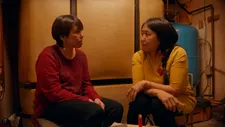 |
| Tautuktavuk |
“I had so many emotions during isolations because it was very long,” she says. “And having children, and the news –I had to stop listening to the news and shut off the TV and the radio and stop looking at Covid because I was in a panic mode. It got so into me that I had to step away from it all and just live a normal life inside the apartment with my two children and say ‘Okay, we can be okay. It's okay to go for a walk across the block and come back and we'll be okay.’
“I think they scared us on purpose. We were protesting on oil pipeline, and the government was really at us. And that was the perfect time to stop the world. Black Lives Matter was happening, the oil pipeline was happening. People were speaking up as humanity.” It was, she suggests, a major lost opportunity.
The other big subject which the film takes on is domestic abuse.
“I think it's in every community in every city in the entire world,” she says. “I think that it is a hidden secret that a lot of us don't talk about. But it is more common now for a woman to escape a violent abuser, compared to when I was a kid, or even a teenager. There's a lack of support system up north, there's a lack of mental health support. There's no addiction facility whatsoever. You're going to go down south to get treated if you want treatment. It's a broken system that is not working.”
Some people end up in court due to behaviour which is essentially a response to suffering, she says. “And there's, in my opinion, racial discrimination in the justice system, the police system. This government says they want to reconcile, they want to work together. I would love to see actions happening. I would love to see funding coming in. I would love to see Inuit doctors, Inuit lawyers, Inuit psychologists and psychiatrists. If we were actually treated equally, we would not be living in 2023 still begging for equal living.
“I like to use the example of one time I was in Ottawa several years back. I lived in Edmonton. I've seen racism. I lived in Ottawa. I've seen racism. I lived in Montreal I’ve seen racism. When you're indigenous, it's pretty easy to see it. When you're not indigenous, you think Canada is the best place in the whole world. if you really took time to see and feel what indigenous people feel and see, then you might have a second opinion.
“There still need to be some actions done to implement those promises of truth and reconciliation. And, you know, the Inuit didn't choose to be in an English world. We didn't choose to be Canadians. Now we are. I think Canada has made efforts to make improvements, and I would love to continue to see more funding for housing, funding for healthcare, education. That is what makes the economy healthy in the north.”
She recalls a time when she was out with her young nephew and was stopped by a non-Inuit person who shoved her, saying that she didn’t pay taxes and demanding to know why she was there.
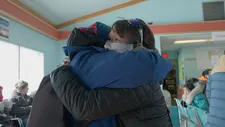 |
| Tautuktavuk |
“I said ‘Well, I think you have a misunderstanding. I pay more taxes than any southern person, because I live in the far north. Wherever you're getting your information, you need to dig deeper and ask yourself “What is really the history of Canada?”’ And I said ‘You either go ahead and bully us now, and get this nephew of mine to see that your ethnic group is a bully group, or you can pause and walk away and get your group and my young nephew to understand that there's so much we need to learn from each other.’
“The leader of the gang was like ‘Let's walk away.’ So they walked away. I'm opinionated and I speak out. If I was another woman who doesn't speak out, what would have happened? My wallet would have been taken. I could have been hit. There's so much misinformation for so long in the European schools in Canada, that our messages are important to be taught by us, for us and for others, so that there's a better understanding. We pay taxes, we live in modern houses. We are striving. I think sometimes some people think Eskimos lived a long time ago in an igloo, and here we are.”





















